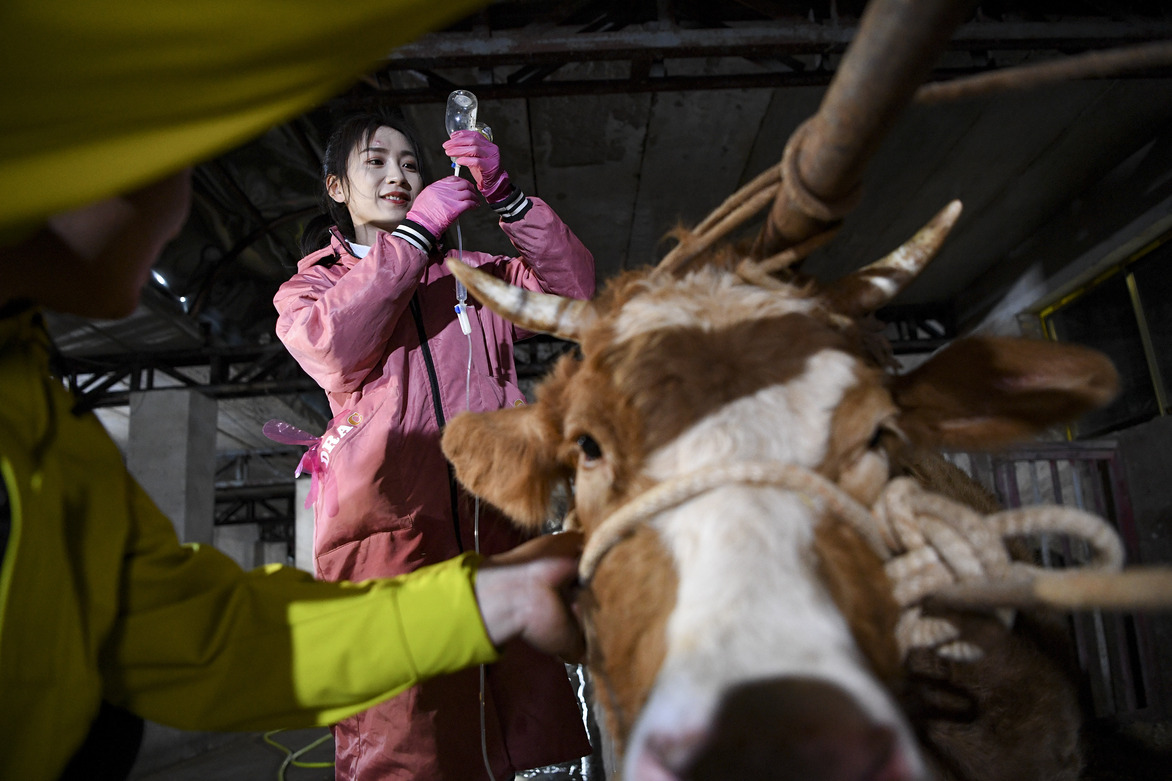Crossing mountains, Chinese youth building future beyond the fields
Xinhua
06 Jun 2025

BEIJING, June 6 (Xinhua) -- On a crisp spring morning, Wang Bing navigated frost-rimmed paths toward her office at the government building of Taxkorgan Tajik Autonomous County in northwest China's Xinjiang Uygur Autonomous Region, a windswept frontier perched 4,000 meters above sea level on the Pamir Plateau.
Last year, the 24-year-old from Inner Mongolia Autonomous Region in north China had joined 44 peers in the "Go West" program, trading city life for a government audit role in one of China's most remote regions. Her sun-burned cheeks tell a story shared by hundreds of thousands -- generations redefining success through service in the nation's hinterlands.
Wang's journey mirrors a seismic shift among China's youth. Since its launch in 2003, China's "Go West" program has enabled 540,000 young volunteers to serve across over 2,000 county-level regions in the country's vast, underdeveloped western regions for a year or more, according to the Communist Youth League of China. The talent program seeks to bring fresh perspectives and energy to areas with significant growth potential.
In Kuqa City's No. 3 Middle School, Liu Daqian from Harbin Institute of Technology (HIT) in northeast China, helps his students, who once "struggled to hold a mouse," to practice robot programming. In January 2024, an HIT alumni-founded company donated an AI laboratory to the school. That same year, two student teams mentored by HIT volunteer teachers won national competition awards, setting a new record for southern Xinjiang.
"I studied bridge engineering, and I want to build that same kind of bridge, one that connects children to a bigger world," said Liu, who teaches geography. To his students, the witty and humorous teacher from Heilongjiang Province possesses a magical charm -- he always seems to have the answer to every question.
Of those in the "Go West" program, over 55,000 volunteers have served in Xinjiang, a region covering one-sixth of China's territory, with more than 15,000 choosing to remain in Xinjiang long term, the regional Communist Youth League Committee revealed.
Wang Jiamin, meanwhile, has returned to familiar territory but in a new role. After earlier teaching in rural Yunnan Province in southwest China via this program, the Beijing Foreign Studies University graduate has gone back to Yunnan after her stint as a student in the Chinese capital, this time serving as a civil servant. Calling Yunnan her "second hometown," Wang expressed excitement about trekking through the fields and visiting the homes of villagers to persuade families to send their children back to school.
There are also rooted professionals active in rural settings in the west of China. Dressed in pink scrubs and gloves, 29-year-old veterinarian Bai Hua deftly examined a cow in Guyuan of northwest China's Ningxia Hui Autonomous Region, where she was born into a cattle farming family and has practiced as a veterinarian for a decade since graduating from a local vocational-technical school.
"Field vets must travel village-to-village daily and most can't handle it," she said, recalling initial skepticism from farmers about her petite frame. "But skill outweighs size," she added. Her team now treats over 100 livestock daily -- providing critical expertise to remote farms.
Youth-driven innovation is transforming rural economies. In the mountainous areas of Longnan, northwest China's Gansu Province, tech-savvy entrepreneur Zhao Wuqiang could be seen live-streaming his walnut oil products to national audiences. A former software engineer in eastern China, Zhao made a pivotal career shift 14 years ago. His foresight of China's internet boom and his hometown's untapped potential combined to create a 380-million-yuan (about 52.9 million U.S. dollars) business integrating more than 200 farming cooperatives, establishing direct farm-to-table supply chains while modernizing walnut cultivation for some 12,000 farmer households.
"Upgraded rural internet infrastructure and logistics networks have been game-changers for our e-commerce growth," Zhao said. The ex-programmer's company has garnered 130,000 followers on social media platforms.
Official statistics showed that as of the end of 2024, over 90 percent of China's administrative villages had achieved 5G network coverage, with gigabit broadband networks now available in all county-level regions. Notably, rural logistics infrastructure has also seen significant enhancement, with 346,000 integrated mail and delivery service stations now operational at village level -- providing express delivery access to more than 95 percent of the country's administrative villages.
As China accelerates its agricultural modernization, a growing wave of urban youth are returning to their rural roots. In Anji County of east China's Zhejiang Province, an eco-tourism hotspot which drew over 34 million visitors last year, Ding Chuxiao, 27, blends design flair with tea culture and farm experiences.
Ding's creative teahouse showcases her artistic vision through bamboo products, white tea caddies and canvas bags with ink-wash painted tea hills, capitalizing on Anji's booming rural tourism. The slower pace there fuels her creativity, and Ding's business now generates revenue of more than 100,000 yuan annually.
China's urban-rural development model preserves rural landscapes while injecting modern elements, addressing agricultural gaps to achieve shared prosperity. "Young people bring fresh perspectives and market savvy to identify new opportunities in rural revitalization," said Xue Zelin, a senior fellow and secretary of the Communist Youth League Committee of Shanghai Academy of Social Sciences.
To date, more than 12 million people have returned to or settled in rural areas to start businesses across China, according to Han Wenxiu, executive deputy director of the Office of the Central Committee for Financial and Economic Affairs, who noted that human capital is fundamental to rural revitalization, emphasizing the need to leverage the countryside's abundant opportunities to attract talent while utilizing its pleasant and scenic living conditions to retain them.
"Even deep in the mountains, if you settle in with commitment and perseverance, you'll grow upward and see the promise of rural revitalization," Zhao said.
